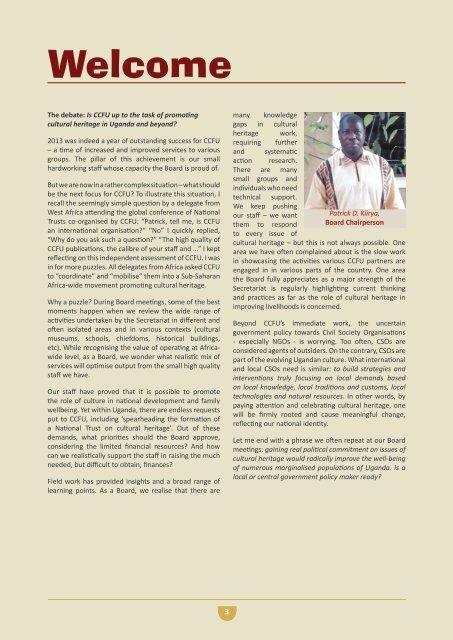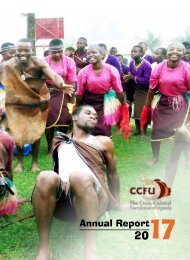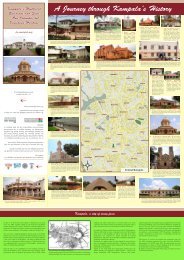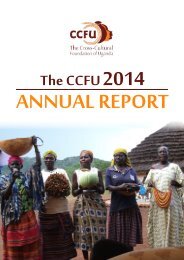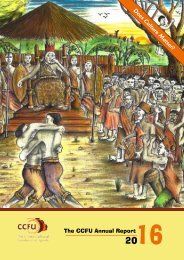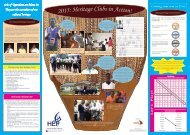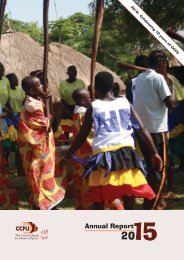Create successful ePaper yourself
Turn your PDF publications into a flip-book with our unique Google optimized e-Paper software.
Welcome<br />
<strong>The</strong> debate: Is <strong>CCFU</strong> up to the task of promoting<br />
cultural heritage in Uganda and beyond?<br />
<strong>2013</strong> was indeed a year of outstanding success for <strong>CCFU</strong><br />
– a time of increased and improved services to various<br />
groups. <strong>The</strong> pillar of this achievement is our small<br />
hardworking staff whose capacity the Board is proud of.<br />
But we are now in a rather complex situation – what should<br />
be the next focus for <strong>CCFU</strong>? To illustrate this situation, I<br />
recall the seemingly simple question by a delegate from<br />
West Africa attending the global conference of National<br />
Trusts co-organised by <strong>CCFU</strong>: “Patrick, tell me, is <strong>CCFU</strong><br />
an international organisation?” “No” I quickly replied,<br />
“Why do you ask such a question?” “<strong>The</strong> high quality of<br />
<strong>CCFU</strong> publications, the calibre of your staff and …” I kept<br />
reflecting on this independent assessment of <strong>CCFU</strong>. I was<br />
in for more puzzles. All delegates from Africa asked <strong>CCFU</strong><br />
to “coordinate” and “mobilise” them into a Sub-Saharan<br />
Africa-wide movement promoting cultural heritage.<br />
Why a puzzle? During Board meetings, some of the best<br />
moments happen when we review the wide range of<br />
activities undertaken by the Secretariat in different and<br />
often isolated areas and in various contexts (cultural<br />
museums, schools, chiefdoms, historical buildings,<br />
etc). While recognising the value of operating at Africawide<br />
level, as a Board, we wonder what realistic mix of<br />
services will optimise output from the small high quality<br />
staff we have.<br />
Our staff have proved that it is possible to promote<br />
the role of culture in national development and family<br />
wellbeing. Yet within Uganda, there are endless requests<br />
put to <strong>CCFU</strong>, including ‘spearheading the formation of<br />
a National Trust on cultural heritage’. Out of these<br />
demands, what priorities should the Board approve,<br />
considering the limited financial resources? And how<br />
can we realistically support the staff in raising the much<br />
needed, but difficult to obtain, finances?<br />
Field work has provided insights and a broad range of<br />
learning points. As a Board, we realise that there are<br />
many knowledge<br />
gaps in cultural<br />
heritage work,<br />
requiring further<br />
and systematic<br />
action research.<br />
<strong>The</strong>re are many<br />
small groups and<br />
individuals who need<br />
technical support.<br />
We keep pushing<br />
our staff – we want<br />
them to respond<br />
to every issue of<br />
Patrick D. Kiirya,<br />
Board Chairperson<br />
cultural heritage – but this is not always possible. One<br />
area we have often complained about is the slow work<br />
in showcasing the activities various <strong>CCFU</strong> partners are<br />
engaged in in various parts of the country. One area<br />
the Board fully appreciates as a major strength of the<br />
Secretariat is regularly highlighting current thinking<br />
and practices as far as the role of cultural heritage in<br />
improving livelihoods is concerned.<br />
Beyond <strong>CCFU</strong>’s immediate work, the uncertain<br />
government policy towards Civil Society Organisations<br />
- especially NGOs - is worrying. Too often, CSOs are<br />
considered agents of outsiders. On the contrary, CSOs are<br />
part of the evolving Ugandan culture. What international<br />
and local CSOs need is similar: to build strategies and<br />
interventions truly focusing on local demands based<br />
on local knowledge, local traditions and customs, local<br />
technologies and natural resources. In other words, by<br />
paying attention and celebrating cultural heritage, one<br />
will be firmly rooted and cause meaningful change,<br />
reflecting our national identity.<br />
Let me end with a phrase we often repeat at our Board<br />
meetings: gaining real political commitment on issues of<br />
cultural heritage would radically improve the well-being<br />
of numerous marginalised populations of Uganda. Is a<br />
local or central government policy maker ready?<br />
3


